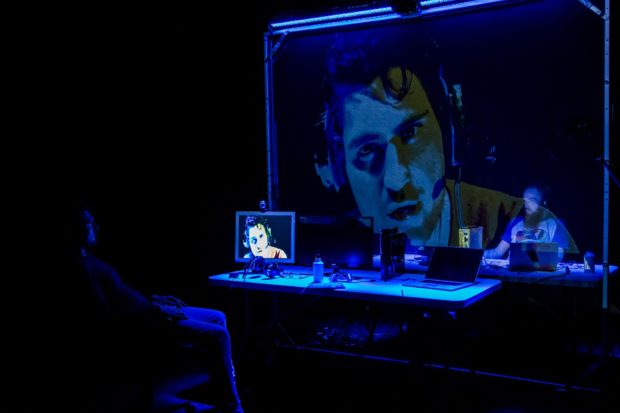You have no items in your cart. Want to get some nice things?
Go shopping
Before you enter the theatre, you are asked to join a special WhatsApp group as part of the show. For once, we are not asked to switch off our phones. On the contrary, there is a recommendation on the website to come with a charged mobile.
We all need to feel that we matter somewhere. This is nothing new. Even as I write this, young men born without a place in the world are scrambling to get to Europe in the hope of finding one. How about those already in the countries where they were supposed to have “money, power and sex”? The Believers Are But Brothers won a Fringe First Award at Edinburgh last year. It tells the stories of bored young men who live out their fantasies and their resentments online – with disastrous real life consequences.
Javaad Alipoor is the writer, the performer and the co-director (the other director is Kirsty Housley) of the show. A native of Bradford, the son of Iranian exiles, Alipoor has built his career through his work with disenfranchised communities in and around Bradford. His previous plays, My Brother’s Country (about a murdered Iranian pop icon) and Orgreave: An English Civil War (about the miner’s strike), all contained cross-platform digital elements. The Believers continues this tradition, using technology in creating a state of mind.
The play begins in a group chat. Alipoor is on his phone on the stage and we are looking at ours in our seats. Behind a screen we can see the only other person on stage, the silent “Operator” played by Luke Emery, a producer of the show. He spends the entire hour locked behind a computer screen, typing away. We suspect his power when the only sound in the theatre is the ping-ping of messages being received. “Social media is where everybody has a voice.”
Group chats are anonymous and democratic, the performer explains. “Your opinions are disconnected from your identity.” So far so good for the “alienated” young British Muslims that the mainstream media has been labelling for so long that I’ve typed this cliché without even thinking. Alipoor stands up and comes to the microphone. While our phones ping with questions (how many Muslims live in the UK?) and memes that become increasingly strange, Alipoor struggles for our attention. A screen behind him is showing us clips; Alipoor is speaking to us.
The Believers is a story of two human beings, Atif and Marwan, trying to make sense of their lives. In Alipoor’s voice, these characters are no longer stereotypes; they come to life. We are in their skin, looking through their eyes at the covers of ISIS propaganda magazines, watching heartbreaking footage, imagining what it would be like to step into the war game, to fight for the creation of a nation where men like them can matter. The other side of anonymity is coming through. Social media as a vehicle for violence and hate.
Now we meet another human being trying to make sense of his life. This one, Ethan, is white and suburban. Alipoor shows us his reality as vividly as he did those of Atif and Marwan. Ethan is alone in his bedroom where he maybe once dreamed of love but now is losing his identity, absorbed into alt-right movements, extremist group chats, sexist and racist meme culture. We all need to feel like we matter and so Ethan, just like Atif and Marwan will act to turn his virtual fantasies into reality. For the white boy, it’s a small exercise – legal, and with terrible consequences for all of us.
The Believers Are But Brothers continues at the Bush Theatre until February 10.
About Isabelle Dupuy
Isabelle Dupuy is a writer based in London. She is currently working on a novel "Living the Dream"




